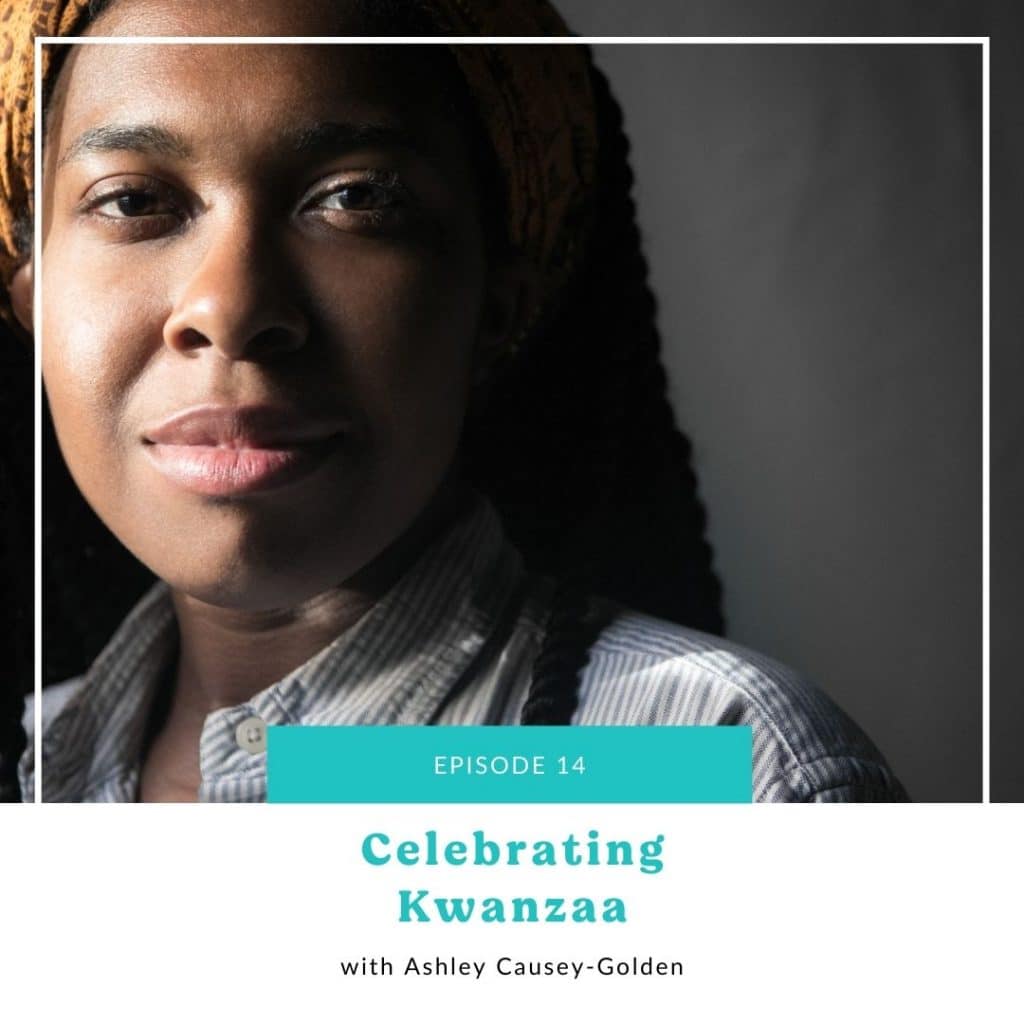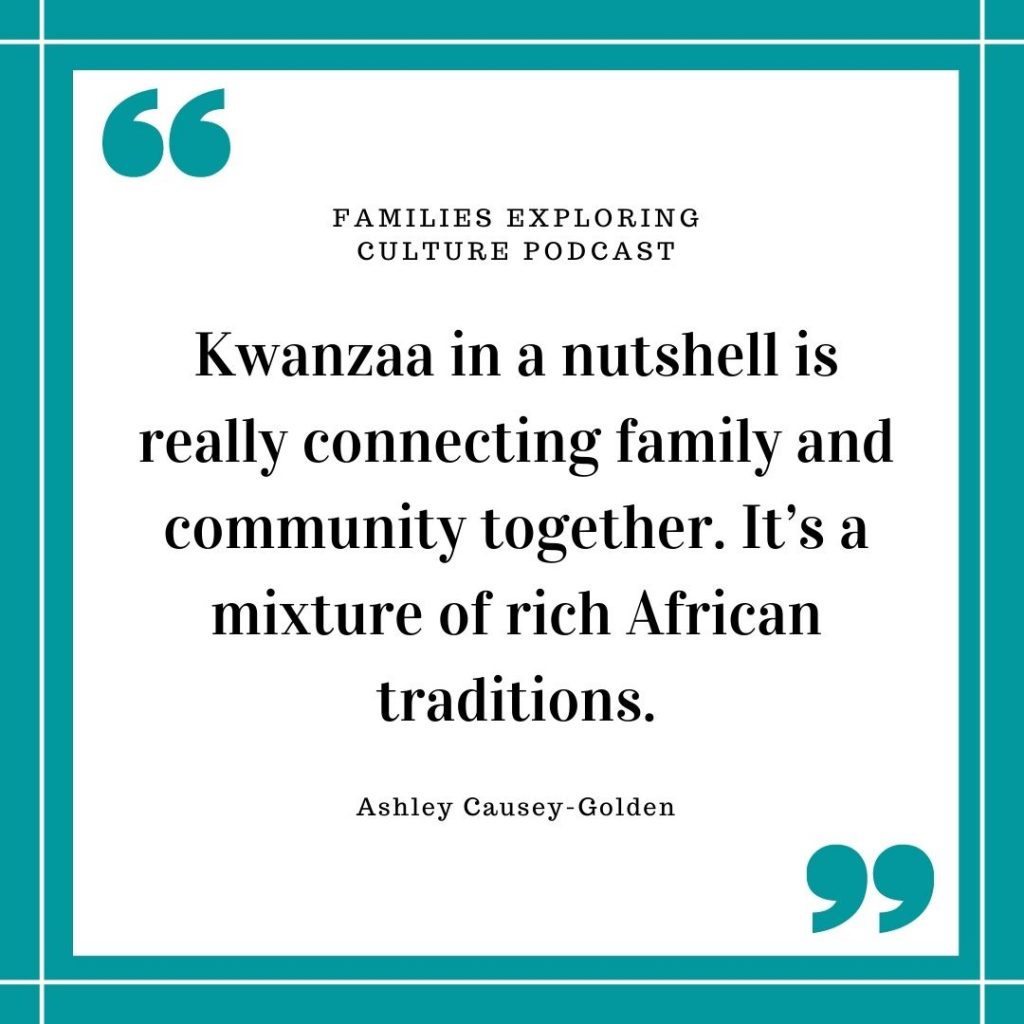14: Celebrating Kwanzaa
Learn all about Celebrating Kwanzaa with teacher Ashley Causey-Golden as she shares the meaning and symbolism behind it, the importance of embracing the principles of Kwanzaa every day, and how we all can celebrate it.

Here is a virtual field trip for kids about Kwanzaa that Ashley helped me put together. Listening to the episode (or reading through these show notes) can help prepare parents to help guide children through the virtual field trip.
Table of contents
What is Kwanzaa?
Kwanzaa is a rich mixture of African traditions and cultural values of family, community, and culture. It brings together traditions from many different countries and cultures within Africa and can’t be defined by only one.
Kwanzaa was established in 1966 by Dr. Maulana Karenga during the Black freedom movement.
Let’s think about what that means—it was only 54 years ago. There was a mass filling a void of knowing about Black culture physically, culturally, and spiritually. Kwanzaa came in the midst of fighting for Black studies at colleges and universities, founding independent schools, building cultural centers, theaters, and art galleries.
Kwanzaa is not a reactive choice, it is not meant to replace more commercialized holidays or holidays that lack African or Black influence. You can celebrate both Christmas and Kwanzaa.
This holiday is in line with other holidays like Pioneer Day in Utah where people celebrate their ancestors and what struggles they overcame, or King Kamheameha Day in Hawaii where we celebrate the cultural heritage that was almost lost.
It is about being proactive. It is about bringing a self-affirming, intentional, and positive celebration into your home. Tradition helps ground us and the culture becomes an anchor which helps individuals find and establish a starting point.
The principles
There are seven values or principles to Kwanzaa (Nguzo Saba) but these can be celebrated all year round. These principles can be something intentionally practiced every day.
The seven principles are:
- Umoja (unity)
- Kujichagulia (Self-determination)
- Ujima (Collective Work and Responsibility)
- Ujamaa (Cooperative Economics)
- Nia (Purpose)
- Kuumba (Creativity)
- Imani (Faith)

What does Kwanzaa mean to you?
You can come into Kwanzaa from different starting points. If you didn’t celebrate growing up, it’s a great starting place. You can celebrate it as a holiday and each subsequent year you can think about, “How can I bring this more into my daily practice?” Then when you come together on December 26th you can reflect on the growth as a family you’ve experienced as you’ve intentionally practiced these values.
To Ashley, it means a place of reconnecting. She learned about it in college but it wasn’t until she worked in a school in New York that they reviewed the principles every day. She realized that it is an intentional practice and isn’t solely formed for African Americans or black people.
For Ashley it’s, “How can I become a better citizen, daughter, friend, mother; really thinking about the community?” It resonated with her because it made her feel more connected and rooted in who she is as an individual and as a member of the community.
She didn’t celebrate Kwanzaa growing up. She celebrated Christmas and heard about Kwanzaa in her early 20s. It was not until her late 20s when she started working at Seneca Village Preschool that she actually started to learn more about African culture and Kwanzaa since they talked about the seven principles every day.
What are some of the symbols of Kwanzaa?
There are several items that are typically found in displays. The kinara with 7 candles is placed on a mat with corn and fruits of the harvest.
The red, black, and green represent the black nationals flag. The red represents blood that was spilled to fight for their liberation. The green represents the wealth of the land’s resources. The black represents the earth.
Gifts that are handmade, the kinara and unity cup, the symbols of the harvest are not the end goal but tools to help communicate each value, each principle to your children, friends, and family. Everyone has to start somewhere and it’s okay to start small.
You also don’t have to have all of the pieces to display to be able to celebrate! When you are starting something new or you don’t have ties to a culture, the fear of doing something wrong and seeming disrespectful can be hampering.
Don’t miss the essence or center of coming together for Kwanzaa which is talking about the 7 principles.
I shared about my family’s own experience celebrating Day of the Dead this year. Although I have Mexican heritage I don’t know much about the holiday. Wanting to connect more with my heritage led us to do research on Día De Los Muertos and to build a very small and simple ofrenda. It’s something that we will build on each year as we continue to learn more and gather pieces to add.
Ashley suggested that you can do libations where you start small- like having a candle, some incense, a living plant, bring a picture of an ancestor, and bowls where you can pour water in honor of your ancestors.
We can model for our children that it’s okay to learn and grow, there is joy in the exploration process. Bring 2-3 pieces at a time and talking with your children about what each piece means.
What are some of the ways we can honor the spirit of Kwanzaa in our homes?
Start with the why. Why it exists? Why do you want to celebrate Kwanzaa? Why is it interesting to you? Kwanzaa is something that everyone can celebrate but the origins or our starting place may look a little different.
It’s also important to take a look at our own biases before learning or celebrating someone else’s traditions. You want to make sure your intentions are in the right place, that you are comfortable talking about race and what the black community has lost and was stolen. When talking with younger kids, especially for children of color, you have to establish a strong sense of self before you start talking about harder topics.
There is nothing wrong with understanding the surface culture, but work through to get to the deeper culture like the intentionality of what each symbol means and how we can bring it into our daily practice of how we treat ourselves and our community.
Find websites and books by individuals who share or identify with the cultures or traditions that you are learning about. Although you can find information by others about that culture, it’s important to start from the source because there are lots of nuances that people outside of the culture don’t see or understand.
Thank you for joining me on this journey! Happy exploring!

Other episodes you may like
Listen to this episode
Show notes links
Ashley Causey-Golden is an early childhood teacher in Atlanta, GA, and owner of Afrocentric Montessori. She has worked and explored a number of educational ideologies–Montessori, Waldorf, and Reggio Emilia as well as worked in different educational settings from schools to homeschooling collectives as well as unschooling. Each of her experiences has deepened her love and admiration for children and their limitless capacity to thrive.
https://afrocentricmontessori.com
https://www.instagram.com/afrocentric.montessori/
First Name Basis podcast episodes:
Teaching kids about racism: https://firstnamebasis.libsyn.com/212-how-to-talk-to-your-children-about-racism
Appreciation versus appropriation episode: https://firstnamebasis.libsyn.com/216-how-to-avoid-cultural-appropriation
https://www.oprahmag.com/life/a34894866/kwanzaa-principles-candles-meaning/
Virtual field trip for kids: Kwanzaa Virtual Field Trip For Kids
